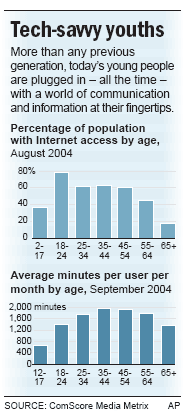Difference between revisions of "Internet Generation"
| Line 1: | Line 1: | ||
====Description==== | ====Description==== | ||
Internet generation is how sociologists termed the generation of people born after the advent of computers as a common tool in daily life. The key fact about this generation is that its members spent their formative years during the rise of World Wide Web (WWW). Therefore, they take the existence of this technology for granted. These people usually have born from 1994 onwards (still at present). Beside this term, writers and editors have proposed many other names, e.g. iGeneration, Generation Einstein, Google generation. | Internet generation is how sociologists termed the generation of people born after the advent of computers as a common tool in daily life. The key fact about this generation is that its members spent their formative years during the rise of World Wide Web (WWW). Therefore, they take the existence of this technology for granted. These people usually have born from 1994 onwards (still at present). Beside this term, writers and editors have proposed many other names, e.g. iGeneration, Generation Einstein, Google generation. | ||
These last terms recall | These last terms recall a service and product widely used by this generation, such as Google using their trendy iBook (Apple). The Internet media has overcome the simple features of information source and mail exchanger to become the virtual image of its users through social networking websites (e.g. Facebook) and "communities" (e.g. YouTube, MySpace) where they can share self-produced contents (e.g. videos, music). | ||
The "Internet generation" is characterized by an unprecedented spending power, which combined to their attitude to explore the surrounding, often results in a increased willingness towards traveling for tourism and also for study or work purposes for long periods. | The "Internet generation" is characterized by an unprecedented spending power, which combined to their attitude to explore the surrounding, often results in a increased willingness towards traveling for tourism and also for study or work purposes for long periods. | ||
An interesting article appeared on the Daily Mail [[http://www.dailymail.co.uk/pages/live/articles/news/news.html?in_article_id=394363&in_page_id=1770]] of couple years ago, picture an uncommon phenomenon of the new | An interesting article appeared on the Daily Mail [[http://www.dailymail.co.uk/pages/live/articles/news/news.html?in_article_id=394363&in_page_id=1770]] of couple years ago, picture an uncommon phenomenon of the new British generations that differently from the previous generation they now spend more times in front of their computer instead of watching TV. | ||
[[Image:Chart_Online_Youth.gif|thumb|Time spent in front of computers]] | [[Image:Chart_Online_Youth.gif|thumb|Time spent in front of computers]] | ||
Revision as of 18:34, 18 May 2008
Description
Internet generation is how sociologists termed the generation of people born after the advent of computers as a common tool in daily life. The key fact about this generation is that its members spent their formative years during the rise of World Wide Web (WWW). Therefore, they take the existence of this technology for granted. These people usually have born from 1994 onwards (still at present). Beside this term, writers and editors have proposed many other names, e.g. iGeneration, Generation Einstein, Google generation. These last terms recall a service and product widely used by this generation, such as Google using their trendy iBook (Apple). The Internet media has overcome the simple features of information source and mail exchanger to become the virtual image of its users through social networking websites (e.g. Facebook) and "communities" (e.g. YouTube, MySpace) where they can share self-produced contents (e.g. videos, music).
The "Internet generation" is characterized by an unprecedented spending power, which combined to their attitude to explore the surrounding, often results in a increased willingness towards traveling for tourism and also for study or work purposes for long periods.
An interesting article appeared on the Daily Mail [[1]] of couple years ago, picture an uncommon phenomenon of the new British generations that differently from the previous generation they now spend more times in front of their computer instead of watching TV.
Enablers
- Growing distribution of contents through the Internet
- Increased availability of the Internet access
- Higher spending power
Inhibitors
- The existence of the digital-divide
Paradigms
Web Resources
Go Back to The future of television 2015
